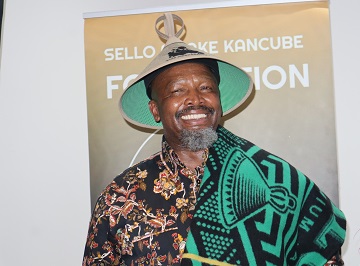Insights from South African Actor Sello Maake KaNcube
By Leseli Mahloane
MASERU – South African actor Sello Maake KaNcube recently visited Lesotho, where he visited various historical monuments including the palace of King Letsie III. Here are some of the highlights where he shared valuable insights with those gathered around him.
He eloquently deconstructed the word “actor” into an acronym: A for action, C for creativity, T for technique, O for observation, and R for reaction. Maake KaNcube emphasized that these five elements are essential for actors in their craft.
Maake KaNcube highlighted the significance of actions in defining a character. He humorously pointed out that a comedian’s ability to make people laugh and a police officer’s identity as a law enforcer are both established through their actions. Similarly, an actor infuses their life experiences into a series of actions scripted by the writer.
When it comes to getting into character, Maake KaNcube believes that the key is simply applying oneself. He quoted Shakespeare’s famous words, “All the world’s a stage, and all the men and women merely players; they have their exits and their entrances.” Maake KaNcube drew parallels between actors and Christians, explaining that just as a committed Christian strives to live according to the scriptures, an actor follows a similar process. Upon accepting a role, an actor reads the script and endeavors to embody the character as portrayed in the written words.
Maake KaNcube finds similarities between various professions and acting, emphasizing that every individual is called to their respective roles, and ministry exists in all aspects of life. He exemplifies this by illustrating how a hairdresser can make you feel confident, and a chef ministers through their culinary skills. He believes that we all have the power to make others feel good in our own unique ways. Just as a lawyer helps a guilty person navigate their situation and provides strategies to alleviate their concerns, individuals across professions play crucial roles in guiding and supporting others.
Artists, according to Maake KaNcube , have the ability to identify and highlight what is considered normal in everyday life. They serve as mirrors to society, observing both external and internal aspects. External observation involves studying people in general, while internal observation focuses on an actor’s own emotions and actions. Maake KaNcube suggests that an actor must even observe their own thought processes since the lines on the page are essentially the character’s thoughts. Thus, an actor internalizes these words, making them their own.
Maake KaNcube reached a profound conclusion that every emotion has its own rhythm of breath. For instance, annoyance and amusement are accompanied by distinct breathing patterns. Actors must master the art of recalling sensations and replicating them on demand. Maake KaNcube advises actors to first observe these sensations and then develop techniques to evoke them at will. For instance, when a character needs to cry, an actor must trick their body into producing tears by manipulating their breath.
Maake KaNcube acknowledges the collaborative nature of the entertainment industry, where directors direct, actors perform, and writers create. He also highlights that performing comes naturally to black people, as different cultures are structured in a way that nurtures performing arts from a young age.
In conclusion, Sello Maake KaNcube’s visit to Lesotho provided valuable insights into the world of acting. He emphasized the importance of action, creativity, technique, observation, and reaction for actors. Maake KaNcube drew parallels between acting and various professions, highlighting the role of observation and the power of ministry in different contexts. He also explored the interconnectedness of emotions, breath, and physicality in portraying authentic characters. Through his words, Maake KaNcube showcased the rich tapestry of performing arts and the significant contributions made by artists across cultures.


